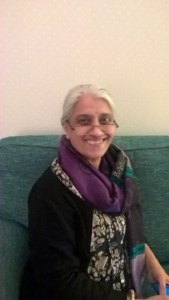Unequal power relations exist in society, and therefore between all participants in the educational process.
These differences find their roots in affiliation to specific social groups based on role, gender and perceived ethnicity.
Such unequal power relations impact on pupil achievement and should be tackled. ♥
Improving teacher education by highlighting power relations.
Much cross-cultural misunderstanding arises from misinformation, prejudice and stereotypes. This is part of a process of ‘othering’, which means excluding those who are ‘not like us’. This othering needs to be acknowledged, challenged and overcome.
Positive attitudes to difference (cultural, racial, ethnic, gender, sexual orientation, language, ability or otherwise) cannot be assumed among teachers.
Want to find out
more?
Contact Chandrika Devarakonda
Contact Michelle Proyer


Chandrika Devarakonda Michelle Proyer
CHAIR CO – CHAIR
University of Chester University of Luxembourg
Books
Devarakonda. C. (2025). Diversity and inclusion in early childhood: An introduction. Second edition 232 pages, London: SAGE
Devarakonda. C (2020) Promoting Inclusion and Diversity in Early Years Settings -A Professional Guide to Ethnicity, Religion, Culture and Language, 192 pages, London, Jessica Kingsley
Devarakonda. C. (2013) Diversity and inclusion in early childhood: An introduction. 189 pages, London: SAGE, https://link.springer.com/chapter/10.1007/978-3-031-67612-3_3
Chapters
Hamilton, P., & Devarakonda, C. (2024). Supporting teachers and children to become critical thinkers of social justice and inclusion. In J. Burke, M. Cacciattolo, & D. Toe (Eds.), Inclusion and social justice in teacher education. Springer. https://link.springer.com/chapter/10.1007/978-3-031-67612-3_3
Devarakonda, C., & Kustatscher, M. (2024). Decolonising early childhood education: Disrupting professional discourses. In M. L. Moncrieffe, O. Fakunle, M. Kustatscher, & A. O. Rost (Eds.), The BERA guide to decolonising the curriculum: Equity and inclusion in educational research and practice (pp. 41-50). Emerald Publishing Limited. https://www.emerald.com/books/edited-volume/17187/chapter-abstract/94176093/Decolonising-Early-Childhood-Education-Disrupting?redirectedFrom=fulltext
Papers
Tan, R., Devarakonda, C., & Rothe, A. (2024). How is inclusion defined on the early childhood level in China, Germany and the UK: A systematic literature review. International Journal of Early Years Education, 1–20. https://www.tandfonline.com/doi/full/10.1080/09669760.2024.2368041
Devarakonda, C. (2024). Children’s participation in research: Tensions and dilemmas around ethical practice. Studia z Teorii Wychowania, 15(1), 219-230. https://sztw.chat.edu.pl/article/544431/en
Devarakonda, C. (2024). Diversity, equity and inclusion. In D. Fitzgerald & H. Maconochie (Eds.), Early childhood studies: A student’s guide. Sage.
Devarakonda, C. (2022). Contexts of culture influencing disability. In A. Hodkinson & Z. Williams-Brown (Eds.), International issues in SEND and inclusion: Perspectives across six continents. Routledge.
We will be present at the ATEE Annual conference in Dublin from
August 26 – August 29, 2025
You can join our hybrid RDC meetings:
August 26, 2025 from 4 to 6pm (Dublin time) – room 3
August 28, 2025 from 11.45am to 12.45pm (Dublin) – room 3
Contact Chandrika and Michelle for the link to join via TEAMS.

